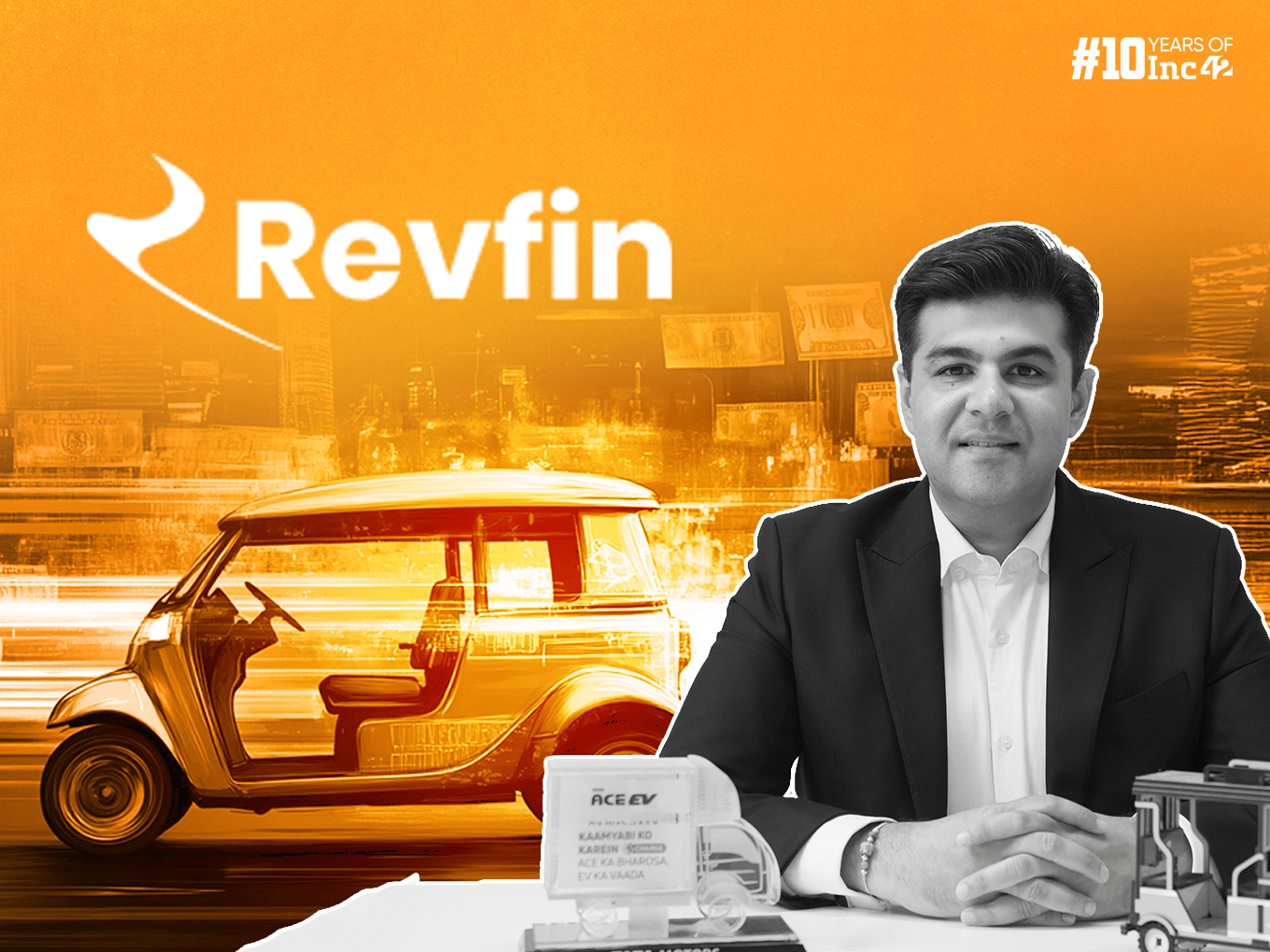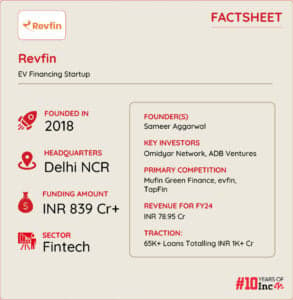
As India’s drive towards sustainable mobility gains momentum, many industry segments such as food/grocery delivery, ecommerce/quick commerce, logistics and ride-hailing services are proactively adopting electric vehicles (EVs) due to cost and energy efficiency. Considering this, Amazon will add 10K+ EVs to its India logistics fleet by 2025. Zomato aims to electrify 100% of its delivery fleet by 2033. Uber may add 25K+ EVs by 2026, while new-age app cabs and bike taxis like BluSmart Mobility and Rapido also use EVs to boost their eco-friendly offerings.
These widespread EV integration plans in the commercial sector may indicate that EV2Ws (two-wheelers) and EV3Ws (three-wheelers) are becoming more accessible and affordable in India. But that is only partially true. Few people from the service sector, especially blue-collar or entry-level white-collar workers across the gig economy, own these vehicles due to high upfront costs and limited access to EV financing.
Sameer Aggarwal, a former credit management professional who worked in the UK, recognised the difficulty of providing loans to individuals without conventional credit data. The problem was more intense in India as the lack of accessible credit hindered many from improving their livelihoods, especially in Tier II and III locations. To ensure easy access to EV credit for independent drivers who buy and operate passenger or cargo electric vehicles, he set up Revfin in 2018 to offer digital loans for three categories of electric vehicles (2Ws, 3Ws and 4Ws) and ancillaries (batteries, conversion kits and more), as well as an emergency Revfin Loans n for existing customers.
Payments are made through its subsidiary NBFC, Aristo Securities.
When Revfin started operations, the Indian EV market was still nascent and lending to driver-owners without a credit history was practically unheard of. Navigating this highly fragmented landscape required innovation in the underwriting process. Hence, the EV fintech developed its own through biometrics and an intent-based psychometric test to analyse potential borrowers’ capability and willingness to repay loans (more on that later).
It has also built strong partnerships with EV makers like TATA motors, Bajaj and Kinetic Green and more for better distribution and a host of OEMs to ensure product guarantees, buybacks (in case of default), after-sales services and battery swapping.
Its second line of business includes working with fleet owners to expand operations across first-, mid- and last-mile deliveries and enhance efficiency by introducing telematics services for fleet monitoring.
Revfin has joined forces with more than 38 fleet owners/operators to scale up EV sales and financing. Among these are Shadowfax, a logistics and delivery service provider; battery tech company Log9; eco cab services provider Evera; and ride-hailing startup Shoffr.
Despite early challenges, Revfin raised over INR 144 Cr via equity and INR 694 Cr via debt funds from noted investors, including Omidyar Network and ADB Ventures, among others. The startup claims to have disbursed more than 65K+ loans totalling INR 1K+ Cr, of which 85% was deployed to underserved people.
How Revfin Connects With Prospects, Taps Into Fleet Business
As Revfin’s target customers are individuals from non-metros who are just above the bottom of the economic pyramid, Aggarwal has decided on a two-pronged approach to reach the prospects. The fintech’s growth has been fuelled by its strategic alliances with 1.7K+ dealers and 69+ OEMs across 23 states who refer prospective buyers looking for EV financing.
It plans to expand these partnerships to five more states and uses a number of initiatives in its marketing mix, including radio, out-of-home (OOH) advertising, canter activity (moving across places to be where the target audience is), social media and dealer branding. The startup has launched a campaign called Zimmedari Ki Sawari in Uttar Pradesh, Madhya Pradesh and Karnataka to deepen EV adoption and sustainable mobility.
In a recent tie-up with SUN Mobility, a Bengaluru-based battery-swapping company, the fintech startup acquired 15K+ EV2Ws for INR 100 Cr to accelerate its operations nationwide.
“With this deal, we have doubled our two-wheeler portfolio and significantly expanded last-mile mobility, further reinforcing our market dominance,” said Aggarwal.
“By partnering with SUN Mobility, we will deploy 1 Lakh EVs pan-India for an estimated INR 1.2-1.5K Cr. This strategic partnership spans 24 months and focusses on deploying EV2Ws for fleets and EV3Ws for cargo and passenger vehicles,” he added.
EV Loan Underwriting Gets A Tech Makeover At Revfin
High credit risk remains the Achilles Heel of any digital-only lending tech startup. Revfin would have been no exception but for its innovative underwriting process. The fintech has designed a proprietary psychometric test in collaboration with IIT-Kharagpur to prevent loan defaults. Powered by machine learning, this test can assess whether borrowers can repay and intend to repay even though they lack credit scores. The startup uses biometrics and cross-references personal details with government databases to combat fraud during onboarding.
Revfin’s app-based loan approval can be carried out in 60 clicks. Here’s how it works:
- Customers can download the Revfin app to begin the application process.
- They need to submit KYC details, which are verified through India Stack services.
- Bureau information, biometrics and psychometric tests gauge the applicants’ capability and intent to repay.
- Approvals are granted quickly based on scores, and offers are generated immediately based on vehicle model and dealer.
- Loans are disbursed promptly.
Revfin offers competitive interest rates determined by various factors such as product risk, cost of funds, customer profile and the availability of a secondary market. Unlike banks that avoid high-risk loans in the commercial EV segment, the startup’s strong underwriting enables it to cater to underserved customers if they meet income and age parameters.
For EV3Ws, the startup charges up to 29% (annualised reducing rate) or a flat interest rate of 17% for six to 60 months. For EV two-wheelers, interest rates are similar, but the tenure varies between six and 36 months. There will be additional fees for loan processing (up to 5%) and a pre-EMI bounce charge of INR 250.
“Through our financing, our customers have generated 2x income, which underscores the substantial impact we have made in their lives,” claimed Aggarwal.
Can Revfin Drive EV Adoption In India With Easy Finance?
The annual loan market for EVs in India is projected to reach INR 3.7 Lakh Cr in 2030, according to a report prepared by the country’s think tank NITI Aayog and energy organisation Rocky Mountain Institute (RMI). However, the landscape for EV financing is more niche and complex, unlike ICE (internal combustion engine) or fossil fuel vehicles.
FAME (Faster Adoption and Manufacturing of Electric Vehicles) I-II schemes launched by the Indian government have undoubtedly generated widespread interest in green mobility and its faster adoption. But a rapid transition, especially in the commercial EV space, currently faces several hurdles, including high interest and insurance rates for retail loans and the lack of tailored financing options for different components (like battery and chassis).
According to an Inc42 report, three-wheelers and two-wheelers continue to lead the charge in EV penetration in India, but both banks and NBFCs charge 1-4% higher interest rates for EV two-wheelers and 1-8% more for three-wheeler passenger and cargo EVs compared to their ICE counterparts.
Industry experts blame the disparity on the absence of a well-formed secondary market that makes EV loans riskier. Per the NITI Aayog-RMI report, industry-led buyback programmes and battery-repurposing initiatives are required without delay to help OEMs and the central government catalyse a secondary market for EVs. Such measures will increase the residual value of EVs and provide banks/FIs with an option for resale in case of borrower defaults.
The future is electric, though. India’s EV sales in FY24 crossed 1.7 Mn vehicles, with electric two-wheelers accounting for more than 55% of the market share, followed by three-wheeler passenger EVs at around 32%. The country is estimated to reach 10 Mn units in annual sales by 2030 and create 5 Mn jobs by that time, Union minister Nitin Gadkari said at SIAM’s annual convention in September. This growth potential presents an excellent opportunity for EV fintech startups like Revfin, evfin, Mufin Green Finance and more.
In sync with the rising sector, Revfin is setting ambitious targets to emerge as a major player. Revfin aims disburse loans amounting to INR 5K Cr by March 2026
By 2027, it aims to finance 2 Mn EVs and disburse loans worth INR 11K Cr. It also targets a 20% market share in top-performing states and wants to secure a 15% market share nationally. Revfin will work with 100 fleet owners across 25 cities to bolster the EV ecosystem, supporting the country’s shift toward sustainable mobility.
But the critical questions remain. Will EVs and EV loans become more affordable in India? Will lending companies adopt differentiated strategies? Will the government chip in with more subsidies and tax incentives to lower sticker prices and bring this category within striking distance of mainstream ICE vehicles?
Even storied carmakers like Tesla, Ford and General Motors are weighing price cuts to reach more customers. As for the stakeholders navigating the commercial EV space, affordability and easy financing will be crucial to drive adoption and growth.
The post How Revfin Is Accelerating India’s EV Transition With Accessible Financing appeared first on Inc42 Media.
